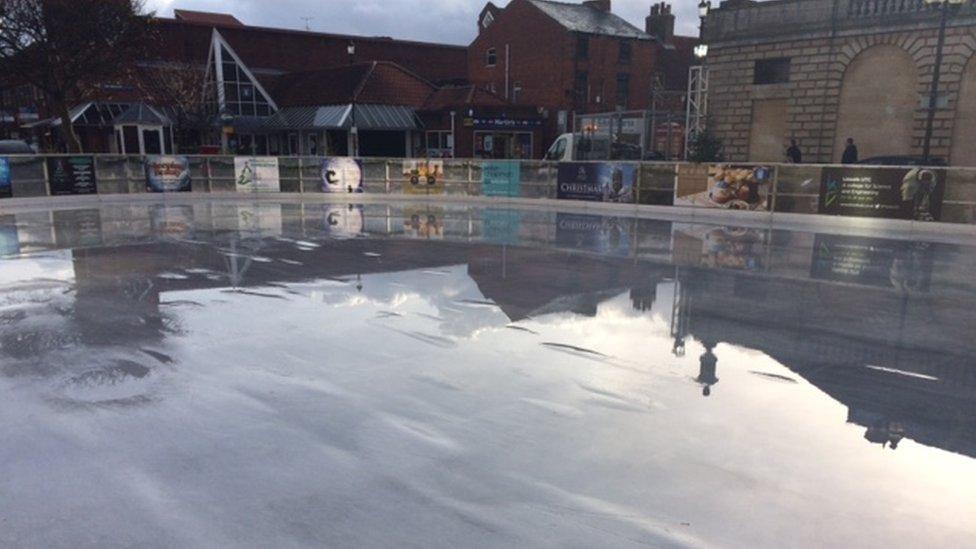December weather: Why is it so mild?
- Published
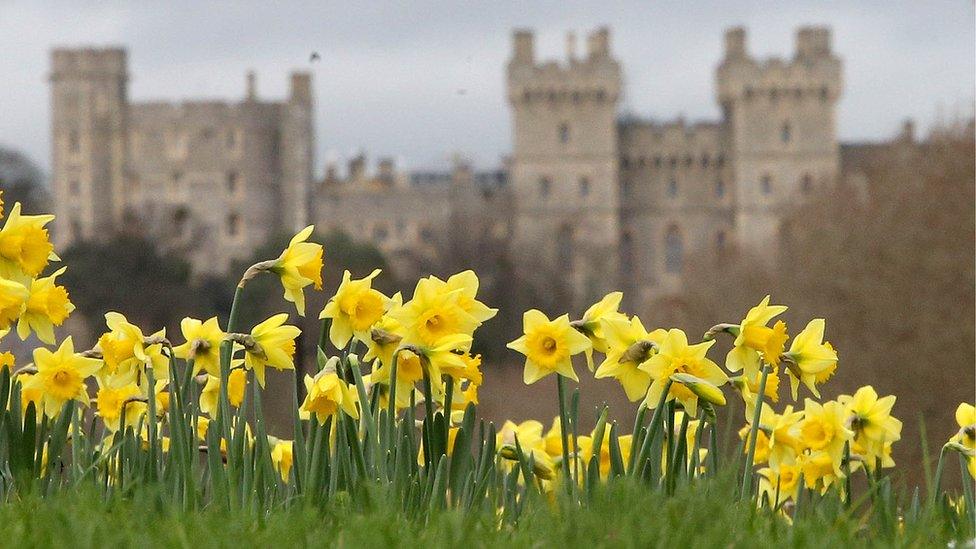
Daffodils are in bloom near Windsor Castle months ahead of time
Unseasonably warm weather across the UK has seen daffodils blooming as far north as Ayr. Temperatures are expected to continue in the double figures for the next week - possibly reaching as high as 16C in London on Saturday.

Why is it so warm?
December is on course to become one of the warmest in more than 100 years. Ben Rich reports.
Tropical air from the Azores and beyond is blowing in from the south west.
As is often the case in meteorology, no one specific factor can explain what has caused this influx of warm air - but this year's strong El Nino weather phenomenon is thought to play a part.
The event occurs when the waters of the Pacific become exceptionally warm and distort weather patterns around the world.
This almost continual warm stream has also been the source of all the moisture and strong winds that brought such devastation to parts of the UK with Storm Desmond.

Have records been broken?
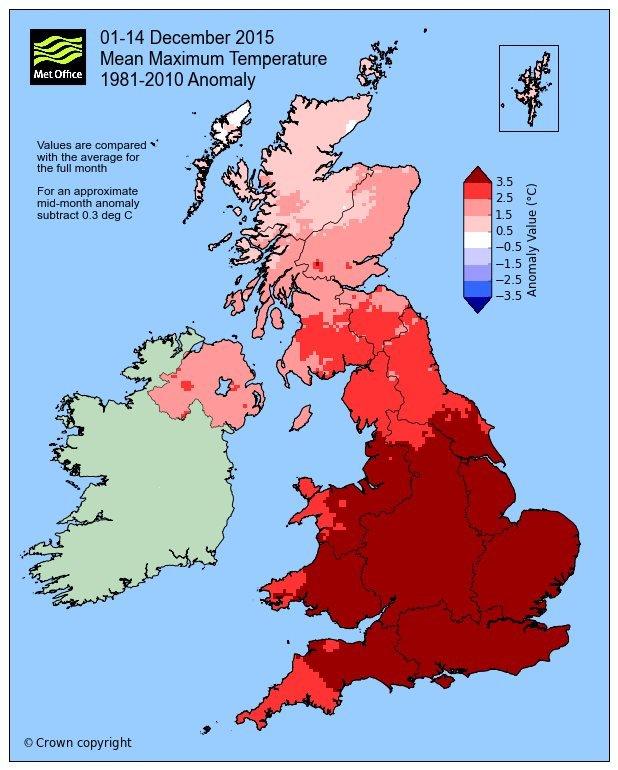
Forecasters say no national temperature records have been broken - but they have come within half a degree of English records.
Temperatures of 16C were recorded at Kew Gardens in London - the average for this time of years is 6.7C. Overnight into Thursday, temperatures reached 13.2C at Exeter Airport, according to forecasters MeteoGroup.
Even Scotland, which has had some snow and cold dips, is forecast to see temperatures of 16C.
The warmest day ever recorded in December was 18.3C in Scotland on 2 December 1948, and the warmest night was 15C in Wales on 12 December 1994.
The BBC's Duncan Kennedy visited Winchester, where he found people doing their Christmas shopping in shorts and T-shirts.
The Met Office says that 2016 is likely to be even warmer than 2015.
People have been sending in their warm December pictures - see a selection of them here.

What will Christmas Day be like?

The chances of a white Christmas look like nil in most parts of the UK, with mild temperatures expected to continue right into the new year.
In London, Christmas Day is forecast to have temperatures of 12C with some light showers, but temperatures could reach as high as 15C.
Edinburgh is forecast to have temperatures of about 7C, and possible spells of sunshine, while in Wales temperatures can expect to be about 11C. Belfast is expected to be a little cooler with a likely high of about 6C, with light cloud.
Bookmakers Coral have slashed the odds on this Christmas being the warmest in history from 5/1 to 2/1, saying it looks likely "we will be sweating" on Christmas Day.

What's this about Saharan dust and blood rain?
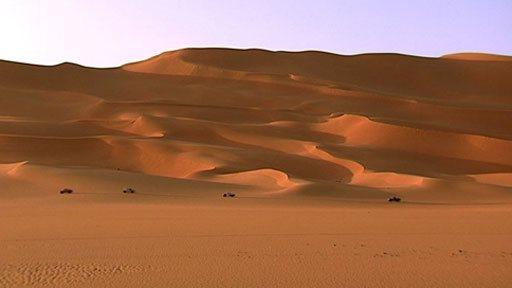
The wind direction means an increased chance of dust from west Africa being blown to the UK
The mild southerly airflow currently affecting the UK brings an increased chance of seeing some Saharan dust, external blowing.
This happens when dust is lifted from its source in west Africa by strong winds, and blown thousands of kilometres at high altitudes to become caught up in UK weather systems.
The dust gets caught in rain droplets and falls to the ground. When the water evaporates, a thin layer of dust is left on surfaces, like cars.
Public Health England has warned that some people with existing heart or lung conditions may experience increased symptoms.
It can also lead to "blood rain", when the red dust causes rain to appear red - although this is very rare in the UK. Even worldwide, documented cases are quite rare.
There were predictions that some dust might descend on Wednesday and Thursday, but it has not materialised.

Any other effects on public health?
It's good news on this front.
The warmer temperatures will not assist the spread of flu.
Dr Gavin Dabrera, of Public Health England, said: "Transmission and survival of the flu virus is enhanced by low humidity which is a feature of the colder temperatures we usually experience over the winter.
"Flu is spread when someone who is infected coughs or sneezes and spreads droplets contaminated with the flu virus."

What about nature?
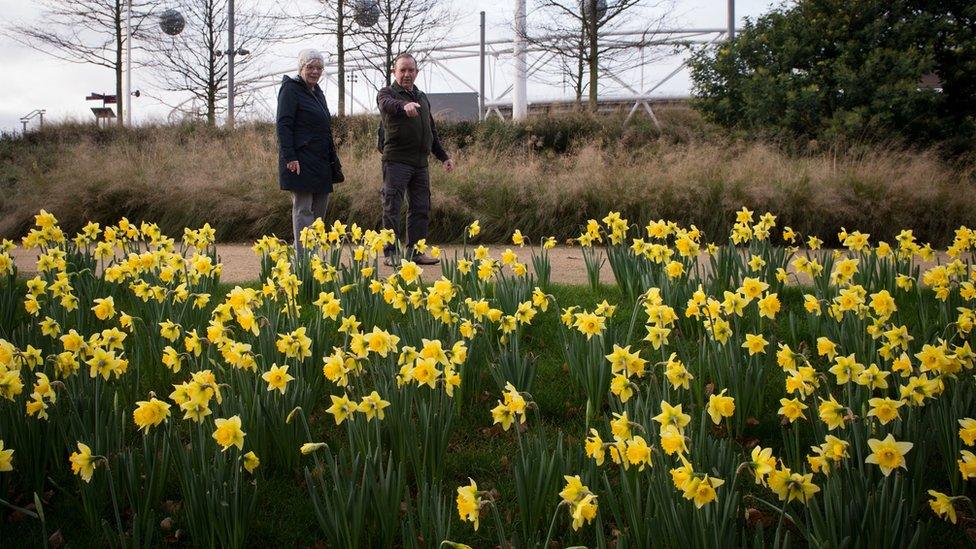
An abundance of daffodils are in bloom at the Queen Elizabeth Olympic Park in Stratford, east London
With the prolonged warm weather, there have been reports from all over the UK of spring flowers and blossom, even as far north as Ayr in Scotland.
The National Trust says this may actually be good news for animals which would typically go into hibernation because it gives them more time to prepare for the upcoming winter.
The higher-than-normal temperatures have also led to a bumper crop of sprouts and has made them much larger than normal.
But it's not good news for all crops. Herefordshire blackcurrant farmer Jo Hilditch, who sells to Ribena, says her fruit is missing out on vital time it needs to chill.
The crop has only had 192 hours of chill time - but one variety needs 1,400 hours and another 2,200.
Raymond Townsend, Royal Botanic Gardens Arboretum manager: "To see the holly with flowers is something else"
Insects can be very reactive to an increase in temperature, due to most of them having cold blood.
Dr Ed Turner, of the University of Cambridge's Department of Zoology, said he had noticed certain species of bumble bee almost four months later than he would expect.
He said: "Insects are ectothermic, or cold blooded and, it being so seasonally mild, they are going to stay.
"The other day I saw a buff-tailed bumblebee and I wouldn't expect to see those after August or September."
This can have a knock-on effect for the ecosystem and agriculture, he said, as insects can continue eating crops or pollinating.

Matt Pengelly's summer rose is still in bloom in his garden in Cornwall
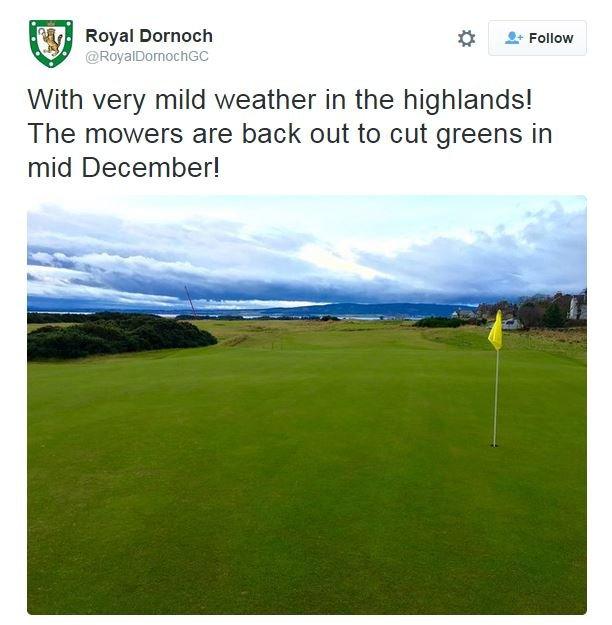
Meanwhile, the unseasonably warm weather dampened Christmas spirits in Lincoln, where an outdoor Christmas ice rink melted into a giant puddle earlier this month.
The chillers for the ice rink were put on full blast but it was not enough to re-freeze the water, and it was forced to close.
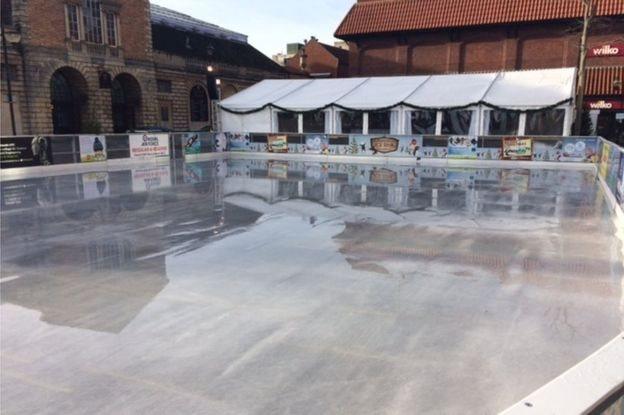
The ice at a Lincoln outdoor skating rink melted despite the chillers being put on full blast
There have also been reports that retailers are struggling to shift winter clothing from the shops, with analysts saying it could mean cheaper jumpers and coats.

Is this happening elsewhere?
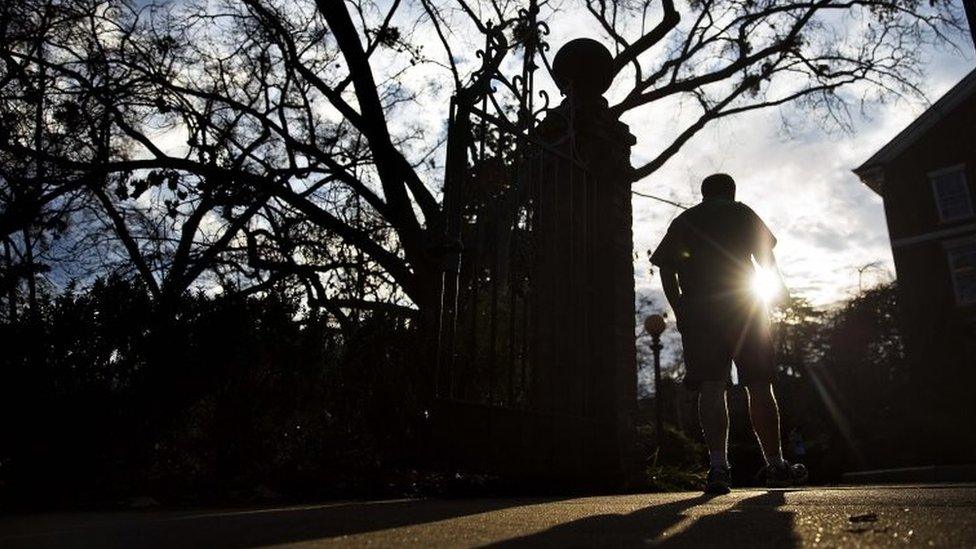
A man wears shorts and short sleeves at the University of Georgia campus in America where unseasonably warm temperatures have reached 21C
Other parts of Europe and north Africa have also seen particularly mild weather over recent weeks, which can all be attributed to the same factors, BBC Weather's Steve Cleaton says.
"Interestingly, north-eastern parts of the USA have also seen incredibly mild conditions in the past few days, which can again be attributed to very large kinks in the jet stream that are likely linked to the El Nino event described recently," he says.

Is it to do with climate change?
We can't say for certain that this spell of warm weather is directly linked to global warming, although it could well be a factor, BBC Weather's Steve Cleaton says.
"Although we have seen a particularly mild spell of weather, the UK spring and summer of 2015 were relatively cool, meaning that for the UK in isolation 2015 is likely to end up being a fairly average year in terms of temperature, rainfall and sunshine statistics."
However, on a global scale, 2015 is set to be the warmest year on record, consistent with current thinking on climate change, he says.
- Published6 December 2015
